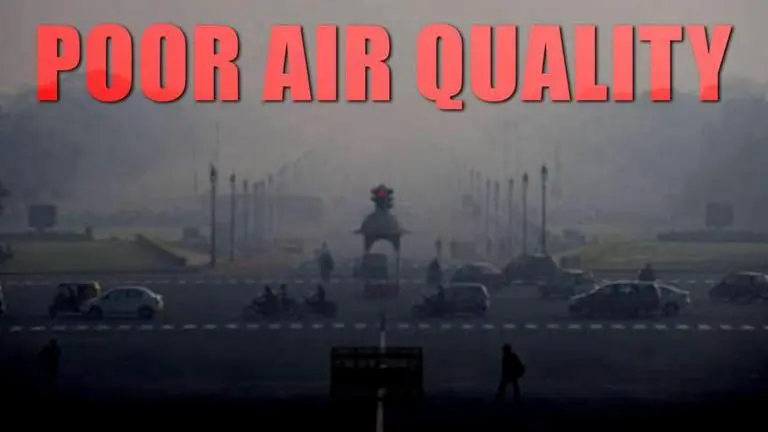Updated 13 October 2019 at 14:11 IST
Delhi registers "poor" air quality for fourth consecutive day
The air quality of Delhi remained poor for the fourth consecutive day on Sunday. The Air Quality Index (AQI) stood at 266, falling under the "poor" category.
- India News
- 3 min read

The air quality of the national capital remained poor for the fourth consecutive day on Sunday, October 13. The overall Air Quality Index (AQI) stood at 266, which falls under the "poor" category. Basically, an AQI between 0-50 is considered good, 51-100 is satisfactory, 101-200 moderate, 201-300 poor, 301-400 very poor and 401-500 is marked as severe/hazardous. As per the prediction of the System of Air Quality Index (SAFAR), the pollution level is expected to slightly improve on Monday, with the AQI ranging between "poor" and "moderate". While the AQI in Dhirpur registered a high of 313, it dipped to 306 in the Mathura Road area. On the other hand, the AQI near Pusa, Airport Terminal 3 and Delhi University stood at 245, 290 and 300 respectively.
SAFAR’s advisory
To combat the pollution levels, the SAFAR has put forth certain suggestions for vulnerable groups. For instance, people have been requested to take more breaks and indulge less in intense activities. Moreover, the organization has asked asthma patients to keep their medicines ready in case of breathlessness. In its advisory, SAFAR noted, "Heart patients, see the doctor if you get palpitations, shortness of breath, or unusual fatigue.” Stringent measures to combat air pollution would be introduced from October 15 in Delhi and adjoining areas such as Gurugram, Noida, Ghaziabad, and Faridabad. This is part of the Graded Response Action Plan (GRAP), which was initially implemented in the Delhi-NCR region in 2017.
Advertisement
Better air quality
Compared to the last few years, the air quality in the national capital is much better. Experts reckon that this is because of the widespread moisture generated by the extended monsoon. After breathing three months of good air, the residents of Delhi suffered a setback on Thursday as an AQI of 211 was registered. This came a day after the capital city witnessed its cleanest post-Dussehra air in 5 years.
Kejriwal's plan to tackle air pollution
On September 13, Delhi Chief Minister Arvind Kejriwal unveiled a 7-action plan to control pollution. This included the distribution of masks, a tree plantation drive and a separate plan to deal with 12 pollution hotspots in the city. Also, he promised to adopt mechanized sweeping and use water sprinklers to control dust. Furthermore, Kejriwal requested the people to abstain from burning crackers as the Supreme Court had banned the sale of crackers in Delhi. He added that the government would host a laser show for the people on Chhoti Diwali. However, the most radical move was the re-introduction of the Odd-Even scheme. On this occasion, it would be implemented from November 4 to November 15. During this period, vehicles would ply alternately on odd and even dates as per their registration numbers.
Advertisement
(With ANI inputs)
Published By : Akhil Oka
Published On: 13 October 2019 at 13:06 IST
